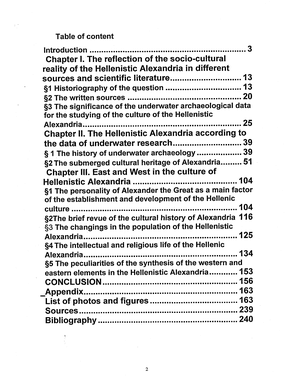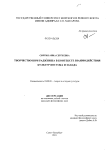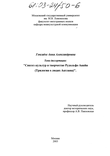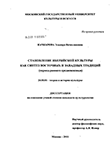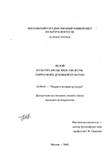Содержание к диссертации
Introduction 3
Chapter I. The reflection of the socio-cultural reality of the Hellenistic Alexandria in different sources and scientific literature 13
§1 Historiography of the question 13
§2 The written sources 20
§3 The significance of the underwater archaeological data for the studying of the culture of the Hellenistic Alexandria 25
Chapter II. The Hellenistic Alexandria according to the data of underwater research 39
§ 1 The history of underwater archaeology 39
§2 The submerged cultural heritage of Alexandria 51
Chapter III. East and West in the culture of Hellenistic Alexandria 104
§1 The personality of Alexander the Great as a main factor of the establishment and development of the Hellenic culture 104
§2The brief revue of the cultural history of Alexandria 116 §3 The changings in the population of the Hellenistic Alexandria 125
§4 The intellectual and religious life of the Hellenic Alexandria 134
§5 The peculiarities of the synthesis of the western and eastern elements in the Hellenistic Alexandria 153
CONCLUSION 156
Appendix 163
List of photos and figures 163
Sources. 239
Bibliography.. 240
Введение к работе
Actuality of the theme
The cultures of the peoples, who have created the great civilizations of antiquity draw attention of scholars until know. Moreover, the interest in the ancient cultures is not just a memorial. The antiquity let us to see the modern culture from the new point of view if historical and cultural analogies are based on the facts that are represented in the system unity and historical outlook.
The culture of Ancient Egypt was evoked from oblivion rather long time ago. There is tradition of studying of this culture in the network of archaeological, historical and philological sciences. But as far as culturology is concerned it is important to bring out this analysis outside studying exclusively material or, on the contrary, spiritual culture. The sociocultural analysis let us to see the culture of a studied epoch as the inwardly disjointed whole that is building up under the influence of different factors, such as environmental, ethnical, socio-political and spiritual.
The analysis of the phenomenon of Hellenism provokes a special interest in the light of the world cultural-historical development. This phenomenon became the first realization the synthesis of the western and eastern cultures. The more ancient attempts of such kind of synthesis were really impossible since "the Hellenistic world" that arouse in the Northern Mediterranean in the 1 mille-nium ВСЕ became the land of so-called "western culture". The conventional flourishing of the ancient Greek culture falls in Athens of the 5 century ВСЕ. Later in the 4th century ВСЕ the expansion of Alexander the Great gave birth to such a considerable phenomenon of culture as Hellenism.
Problem of correlation and synthesis between East and West is one of the most urgent and widely discussed nowadays. The main force in such kind of synthesis today is the western culture that is based on the standards of the political democracy and mass society. The phenomenon of the Hellenism is of interest in particular because it had solved the problem of the correlation between western and eastern in culture in a non-unambiguous way.
The Hellenistic Alexandria was situated in the center of the processes mentioned above and that is why the analysis of the specialties of the Hellenistic culture in that region is the most representative. Moreover, the new methods of research connected with the underwater archaeology let us to include the missing data the whole picture of the Hellenism phenomena. Using of the methods of the underwater archaeology, the science that is relatively young but very perspective, gave the opportunity to reconstruct monuments of history that were, it seemed, irrevocably destroyed. The underwater archaeology also let us to analyze and interpret that kind of sociocultural reality that was known before just according to the writing sources.
We can find in the culture of the Hellenistic Alexandria not just vicinity of the different sides of the western and eastern culture but the attempt of the synthesis of such contrary moments as idolization of the king in the policy and hope on the personal choice of the human being in the philosophy. We will try to give an explanation exactly to this contradiction on the base of the comparison of traditional writing sources and new underwater archaeology data in the suggested Ph.D. thesis The state of the elaboration of the problem
In 19 century the policy of Eurocentrism was given a dare by its alternatives - the ideology of orietalism and the principle of the pluralism of the cultures that was elaborated in the morphology of cultures by O. Spengler. In the 20 century the opposition of cultures was replaced by their synthesis even if confessional and other differences have been remained inside the cultures.
Nowadays a big amount of literature exists devoted to the theoretical analysis of the problem of the synthesis of the eastern and western cultures, in other words, the problem of their diffusion - expansion and interference. This problem is analyzed as in the field of general methodology (E. Sample, R. Chie-lan, K. Haushoffer, G.K. Ligendorf, F. Ratzel, W. Koppers, B. Ankerman, J. Gekkel, M. Guzinde, O. Mengar, M. Betak, J. Hoffman, Y.H. Rivers, R. Dikson, G.E. Smith, A.L. Kreber, O. Rosenshtok-Hussy) as in practical aspect - as applied to the regions and epochs) (F. Grebner, L. Frobenius, W. Shmidt, Y. D. Perry, F. Boas, K. Wisler, K. McClahom, T. Heirda) As far as the culture of Hellenism is concerned we can ascertain that after I. Droizen who first introduced the term "Hellenism" into practice, a lot of works appeared where special aspects of this phenomenon were elaborated more precisely. Among them we can mention the work by C.C. McEvan on the study of the nature of the king power during the Hellenistic time1; the work of V. Ehrenberd that maintains the Egyptian constituent in the process of the idolizaion of the king in the Hellenistic Alexandria . The opposite point of view we can find in the works of H. Berve who insists upon the Greek roots of this cult. He proceeded from the assumption that Alexander the Great was identified with Greek Dionys and thereby concluded the cult of the king from the cult of the Greek heroes3.
The famous Italian scientist A. Adriani made an attempt to interpret the art of the Greek — Roman Egypt from the point of view of combination of the eastern and western elements inside it4. The whole spectrum of different aspects of the life of Hellenistic Alexandria including political history, history of religious beliefs and philosophy is represented in the works of A. Bernard. His researches let us to imagine the nature of synthesis of the eastern and western roots in this culture5. The works of A. Bouman and P. Frayser are clarified the peculiarities of the phenomenon of Hellenistic Alexandria. The social-political, ethnological and linguistic specialties of the different stratum of the urban population are studied there6.
The object of the thesis - is the culture of the Hellenistic Alexandria.
The subject of the thesis - is combination of the eastern and western aspects in the culture of Hellenistic Alexandria.
The goal of the thesis - is to precise the peculiarity of the synthesis of the eastern and western aspects inxthe culture of Hellenistic Alexandria according to underwater archaeological researches that were organized by the Department of the Underwater archaeology of the Supreme Counsel of Antiquities of ARE.
In order to reach this goal the author is setting the following tasks:
• to analyze the eastern and western constituent in the origin of the Hellenistic Alexandria and its culture according to the data of the ancient sources and modern literature;
• to determine the combination of the western and eastern elements of the phenomenon of Hellenistic Alexandria according to the data of the underwater archaeology that precise the topography of this city;
• to expound the character of the synthesis of the eastern and western elements of the phenomenon of Hellenistic Alexandria in socio-cultural aspect;
• to determine the perspective of the development of the underwater archaeology and its significance for the studying of the ancient cultures.
The hypothesis of the thesis
The development of the archaeology as a science and appearing of the underwater archaeology during the last ten years gave significant and unbiased criteria for the verification and specification of the data that was obtained from the narrative sources. There was data of the underwater archaeology that let us to precise the topography of the Hellenistic Alexandria and to understand the peculiarity of the monuments more clearly.
The authors who studied the Hellenistic Egypt agreed in opinions that the unique socio-cultural situation was established here after the conquest of Egypt by Alexander the Great. The endogenous elements came in contacts with Greek elements that were more young and viable and gave birth to the special kind of synthesis of East and West. This kind of synthesis came into being in more organized structure during the time of Roman Empire. Being the representatives of the East and West Egyptian, Greek, Syrian, Judaic and later Roman ethnic groups not only coexisted but even influenced upon each other at the level of material and spiritual culture.
The using of system approach that exceeds the limits of special historical (archaeological), philological or sociological approaches lets to assume that the synthesis of the eastern and western elements in the culture of Hellenistic Egypt was quiet organic in most cases. This synthesis forestalled that kind of specific "openness" with respect to the other cults, traditions, political institutes, philosophical and artistic achievements that will demonstrate later the Roman Empire.
But simultaneous co-existence of democracy that was invented by the Greeks and institutes of the eastern despotism that existed among the peoples conquered by Alexander the Great was not possible. In the "cosmopolitan" state of the Ptolemy this conflict of the eastern and western cultures was solved through the limitation of the Greek democratic institutes and, at the same time, development of the foundation of their spiritual culture - philosophy and the other forms of the theoretical knowledge. Thus the individual choice with the necessity of the restrictions in the poly-ethnic state was "compensated" in the sphere of spirit. This experience was used by the world religion later. The synthesis of the Hellenistic Alexandria differs from the modern variants of the cultural synthesis as the spiritual "openness" here was based not on the democratic way of ruling but on the political institute connecting with the eastern despotic ruling.
Methodological basis of the thesis
The general methodological basis of the work is system-structural analysis that let us to reconstruct the picture of the cultural life of Hellenistic Alexandria as a whole.
Methods of research
The specific methods of studying are genetic, comparative, factorial and special methods connected with underwater archaeology. The methods of underwater archaeology set up premises for the theoretical conclusions of the thesis.
The sources of the study
The writing sources of the thesis are the writing of Roman author Qvint Ennius Flavius Arrianus "Campaign of Alexander", the evidences of the Roman historian Strabo, Tacitus etc. We also used the data of underwater archaeological expedition
The scientific novelty of the thesis:
• For the first time the data of the writing sources and archaeological expeditions was combined in the thesis in order to reconstruct the phenomenon of Alexandria as a cultural unity. Also the eastern (Egyptian) and western (Greco-Roman) elements of the phenomenon were re-examined.
• The latest map with the localization of the most important monuments of the history and culture that are situated under the water in the region of Alexandrine harbor is created. That let us to precise the peculiarity of the culture of Hellenistic Alexandria and to draw a conclusion that special kind of "openness", which was very typical for the Roman Empire later also existed in Hellenistic Alexandria.
The conclusion about the co-existence and interference of the elements of the eastern and western cultures was made on basis of studying of a great amount of monuments that were found during the underwater archaeologi cal survey. The obvious case for this statement is deification of Alexander and kings of Hellenistic Egypt upon the eastern pattern.
• In the thesis it was shown that the Ptolemaic dynasty preserved the typical for Greece interest to the philosophy and to the other theoretical knowledge even replaced the democratic institute by the monarchy with the elements of the eastern deification of the royal power.
• The special kind of synthesis of the elements of the eastern and western cultures was established in the Hellenistic Alexandria; this synthesis is quite different from the modern forms of the synthesis of the East and West since the last is based on the political democracy.
• Also, as an additional task we gave a characteristic to the different stages of the development of the underwater archaeology in ARE. Special attention was paid to the problems of preservation and conservation of the monuments of history and culture. There were suggested methods of storage of the objects in marine museums.
The following positions are submitted for discussion:
1. The data of the underwater archaeology, obtained during the survey the Mediterranean ground in the Alexandria harbor region, let us to create the underwater topographical map with the localization of the monuments of history and art. The subsequent comparison of these data with the written sources let us an opportunity to reconstruct the whole picture of the development of the city in Hellenistic Egypt.
2. Culturology proposes to exceed the limits of special historical (archaeological), philological or sociological approaches that are used during the studying of Hellenistic Egypt. The culturological approach let us to draw a conclusion about existence of a special kind "openness" in the history of Hellenistic Alexandria that creates the basis for the synthesis of the elements of eastern and western cultures.
3. If the Greek colonization was connecting with the development and settlement of the new coastal lands by the Greek citizens, Alexander the Great drew new lands and peoples into sphere of influence of his empire. This policy forestalls that kind of synthesis of the eastern and western cultures, which later will be typical for the Roman Empire.
4. This synthesis of the elements of the eastern (Egyptian with the elements of the Syrian and Judaic) and western (first Greek, later Roman) cultures was rather organic. The creation and dissemination of the common language - koine and attempts to combine Egyptian and Greek were evidences of that statement. Nevertheless "cosmopolitanism" of the Hellenistic Egypt had its limits since in was really impossible to develop the institutions of the "city-state" democracy in the poly-ethnic state. The policy of Alexander the Great became the settlement of this contradiction. Later the other kings from the Ptolemaic dynasty continued this policy. The essential idea of the policy was limitation of the Greek democratic institutions and at the same time development of the Greek culture and philosophy.
5. It is possible to find out a new principle of the organization of culture in Egypt as early as at the Hellenistic time. According to it the limitation of the individual choice in policy was compensated in the sphere of culture. The main ascent in philosophy was made on the inner life of the human being. As a result, for the culture of Hellenistic Egypt was typical both eastern deification of the king and development of theoretical theology by Philo the Alexandrine that became the threshold of the Christian theology. This kind of synthesis is quite different from the nowadays synthesis of the cultures of East and West since it based on the political institutes connecting with despotic king power.
The scientificheoretical and practical significance of the study The methodology and conclusions of the thesis can be used in the scientific studies devoted to the Hellenistic culture, to the combination of the eastern and western elements inside this culture, to the intellectual life in Hellenistic Alexandria. The materials of the thesis can be included in the courses of culturology, the history of culture and history of the Ancient world in the institutes of higher education. The part of the thesis can be included into the program of the special course on underwater archaeology.
Approbation of the thesis
The materials of the thesis were discussed on the scientific conferences: 1 .The 7th International Symposium on Ship construction in Antiquity, Pylos, 1999.
2. Euro- Mediterranean conference, Murcia- Spain 1999
3. The protection of archaeological sites, Kuwait 2002
4. The underwater archaeology - new dicoveries, Moscow, 2002, Moscow City Pedagogical University, 2002
Different statements of the thesis were considered in 7 publication of the candidate for a degree.
The materials of the thesis was used during the preparation of the following students cources: "The Hellenistic Culture and Art", "The underwater archaeology in Alexandria"; "Greek sources on the History and Culture of the Hellenic Alexandria"

